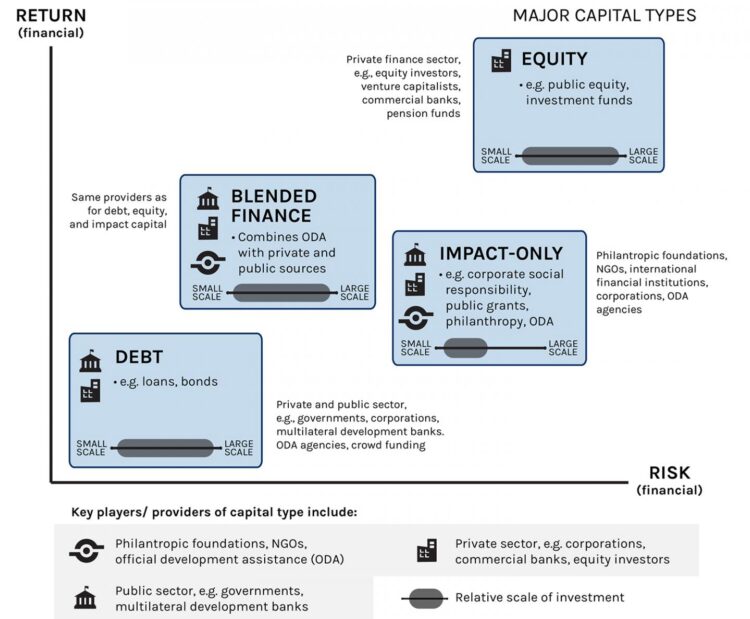Financing a sustainable global ocean economy may require a Paris Agreement type effort, according to a new report from an international team of researchers led by the University of British Columbia.
That’s because a significant increase in sustainable ocean finance will be required to ensure a sustainable ocean economy that benefits society and businesses in both developing and developed countries.
The report, published today – on World Ocean Day – identifies major barriers to financing such a sustainable ocean economy. This includes all ocean-based industries, like seafood production, shipping and renewable energy, and ecosystem goods and services, such as climate regulation and coastal protection.
“The size of the ocean economy was estimated at around USD $1.5 trillion in 2010, and prior to the COVID-19 pandemic, was projected to increase to USD $3 trillion in 2030,” said lead author Dr. Rashid Sumaila, a professor at UBC’s Institute for the Oceans and Fisheries and the School of Public Policy and Global Affairs and Canada Research Chair in Interdisciplinary Ocean and Fisheries Economics.
“But a sustainable ocean economy requires healthy and resilient marine ecosystems, which are being severely threatened by anthropogenic and climate pressures,” said Dr. Sumaila. “There are many opportunities for governments, financial institutions and other players to make financial gains in this type of sustainable economy — but there are also many barriers that need to be overcome.”
Four major barriers identified in the study include:
- 1. A weak enabling environment for attracting sustainable ocean finance;
2. Insufficient public and private investment in the ocean economy due to a lack of high quality, investible projects with appropriate deal size and risk-return ratios to match available capital;
3. A limited ability of people to visualize and develop projects that are attractive to investors; and
4. The higher relative risk profile of ocean investments, where the enabling environment for insurance and risk mitigation is also not in place.
Currently, there is a shortfall in financing a sustainable ocean economy. According to the researchers, governments and public institutions may be a good place to start, in order to close this gap.
“There is scope for raising money from the uses of the ocean, and for part of this to be used to improve its management,” said Dr. Sumaila. “The gap in conservation financing for all ecosystems, which includes funds for a sustainable ocean economy, was estimated at USD $300 billion globally. That is less than one per cent of the global GDP. Can you imagine what we would have available if governments made two or three per cent available?”
This would lead to financial institutions being incentivised to invest, and to the development of an enabling environment with private sector actors who are interested in encouraging green ventures that foster ocean development.
“And then you get insurance companies involved, because working in the ocean is generally riskier than working on land,” said Dr. Louise Teh, a research associate at the Institute for the Oceans and Fisheries.
The report’s authors point to public-private partnerships that have had significant results, including special green investments funds offered by the Netherlands that are exempt from income tax, thus allowing investors in green projects – such as green shipping – to contract loans at reduced interest rates.
“These Dutch green funds have already attracted more investment than can be utilized in the available schemes – an encouraging sign for the future prospects of such instruments,” said Dr. Sumaila.
The cost of inaction regarding the conservation and sustainable use of the ocean is high.
“If we carry on with ‘business as usual’ we still face the cost of coastal protection, relocation of people and loss of land to sea level rise – a cost that is projected to rise from USD $200 billion to a trillion USD annually by 2100,” said Dr. Sumaila. “The centrality of adequate finance to ensure a sustainable ocean economy is such that the world may need a Paris Agreement type effort to meet the needs.”
“Financing a sustainable ocean economy” was published in Nature Communications.
###
Background
The paper was produced with the support of the Secretariat for the High-Level Panel for a Sustainable Ocean Economy. The High Level Panel for a Sustainable Ocean Economy (Ocean Panel) is a unique initiative by 14 sitting world leaders who are building momentum for a sustainable ocean economy in which effective protection, sustainable production and equitable prosperity go hand in hand. Co-chaired by Norway and Palau, the Ocean Panel represents nations of highly diverse oceanic, economic and political perspectives. Members include Australia, Canada, Chile, Fiji, Ghana, Indonesia, Jamaica, Japan, Kenya, Mexico, Namibia, Norway, Palau and Portugal. It is supported by the UN Secretary-General’s Special Envoy for the Ocean.
Funding was also obtained from the World Resources Institute and the OceanCanada Partnership, which is sponsored by the Social Sciences and Humanities Council of Canada (SSHRC).
Media Contact
Katherine Came
[email protected]
Original Source
https:/
Related Journal Article
http://dx.





